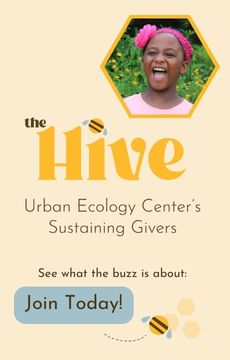What would it look like to have the world we want to live in?
Take some time to think about that question.
I was amazed by how unfamiliar that way of thinking felt. It’s a hard one to answer, but I truly believe that we need to spend much more time discussing what we want our world to look like. That’s one of the main reasons I appreciate the Urban Ecology Center. Our work, of course, does “fight against” some of the things I listed earlier. But at its core, the UEC is not about “filling a gap” or “addressing a problem”— it’s about building the world we want to live in, right here in our own neighborhoods.
I have been reading “The Next American Revolution” by Grace Lee Boggs recently, and she speaks with incredible eloquence on this idea. She posits that our next revolution (which she says has already begun) will not happen through rebellion and protest but through a cultural revolution in which we, together, create a “world based on partnership among ourselves and with our environment.” Boggs says, “We need to go beyond opposition, beyond rebellion, beyond resistance, beyond civic insurrection…we want and need to create the alternative world that is now both possible and necessary. We want and need to exercise power, not take it.” That is to say, our new world will not come from our “fighting against” alone—it will come from what we work for.
So, what does that world look like? Honestly, I think it looks a lot like what I see at the Urban Ecology Center every day. It looks like people nurturing the land, and being nourished by the land. It looks like adults sharing knowledge and skills with children who share their joy and wisdom with adults. It looks like kindness, rooted in the belief that the people around us matter, and that by caring for one another and for our earth, we care for ourselves.
I say this in part because I think it is important to recognize what a magnificent community we have built together, and to thank you for making it so. Perhaps even more importantly, though, I say this to remind everyone during this time of change that we still have all the things and all the people we need to build the world we want. That’s not to say that it will be easy, but it is possible—we can see it happening here at the Center. As Grace Lee Boggs says, “we are the leaders we have been looking for.” It’s up to us, and we have everything we need. We just need to get to work.





